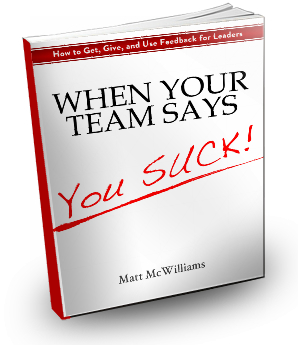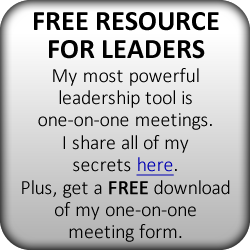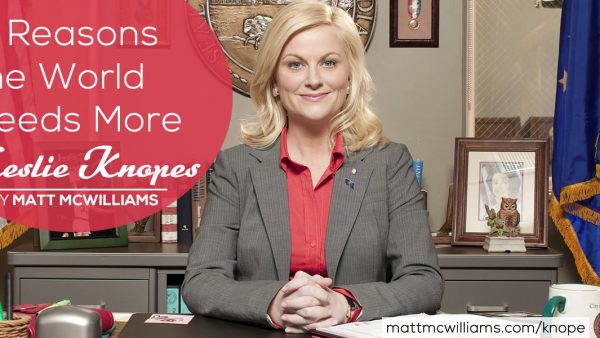“My meetings always seem to drag on at the end.” I often hear that from leaders whose one-hour meetings always take the full hour (or more).

Despite the agenda being fully covered in 45 minutes, the team believes that somehow the remaining fifteen minutes marked on their calendars must be filled. There is seemingly an unwritten requirement somewhere that states that meetings scheduled for a certain time period must never last less time than was scheduled by the organizer. Pffft.
One of the members of this community, Jim Ryan, is struggling with the same issue. He wrote in a comment recently on the post Parkinson’s Law and Why You Need To Set Time Limits:
I see it in meetings when the agenda is done and someone always finds something to talk to fill the rest of the hour.
Have you ever experienced that? The agenda is covered, action items are assigned, everyone knows where the boat is rowing, and…someone keeps talking.
I’m not talking about “after meeting banter.” That is healthy. If you finish a meeting early, it’s OK to take a minute or two to catch up on personal lives, talk about another project, or have an impromptu company Christmas party planning session. That is all a part of building a healthy culture and using time effectively.

But continuing the official meeting and making others feel like they must stay is unacceptable.
So what do you do?
It depends on who you are and what your role is in the meeting.
There are typically three types of people in the meeting:
- Meeting leader
- Participant. These would be those people on a lower rung of the totem pole than the leader or other team members present.
- Senior staff on the same or higher level as the meeting leader
How to end a meeting effectively for all three meeting roles
Meeting Leader
When the agenda is finished, get up. You don’t necessarily have to walk out, but do pack up your notes and stand up.
First, say thank you to those present.
Second, if you have not already, repeat action items and the goal.
The next part is up to you. You can walk out or you can walk directly to someone else and begin a conversation with him or her. But the message is obvious:
The meeting is over.
Yes, this is a very aggressive way to do this and something that at least 60% of you will not be comfortable doing. My only advice is to get over it. That’s why you have the option to start a conversation with someone or a small group. Go tell them how you appreciated their input, ask how their kids are, how a project is coming along, etc. You don’t have to simply walk out.
Participant
This depends completely on your company culture. If the leader is letting the meeting drag on and company culture dictates you let it go, do that. Grin and bear it. Doodle on your notepad or think about your project.
 One alternative I’ve found that is worth trying is to pack up your stuff and stand up, but with deference to the leader. I’ve found that often the leader will follow your cue (kind of shows you who the leader is, huh?). If he or she isn’t standing with you within five seconds, sit back down.
One alternative I’ve found that is worth trying is to pack up your stuff and stand up, but with deference to the leader. I’ve found that often the leader will follow your cue (kind of shows you who the leader is, huh?). If he or she isn’t standing with you within five seconds, sit back down.
The other way that has worked for me is to ask a leading question such as this:
“I know we’re done and all need to get going, but I want to clarify one last thing. . Should I get with you one-on-one now or do you think that’s relevant for the whole group?”
If the leader is eager to address your question, he will either dismiss the others and answer it quickly or answer it for all, ask if there are any other questions, and get the cue to wrap it up. (Related post: Do This in Your Next Meeting. It Works. A must-read for all meeting leaders.)
Senior Staff / Peer of Meeting Leader
If you are on the same level as the leader and were invited to the meeting, stay put.
The last thing a peer should do is stand up another leader.
There is no exception to this rule unless the meeting actually runs over the allotted time and you have another commitment.
Then, after the meeting, share this post with the meeting leader so that he or she knows what to do next time.
How have you seen meetings ended effectively?
Read: More great meeting tips
|
|
Questions?
Text me anytime at (260) 217-4619.
Or…check out some of my free reports to help you get on the right track:
 |
 |
 |
 |
 |
 |
 |
 |
 |





The dean at my school does well at ending on time. If meetings go over, I often get up and leave because I have parental responsibilities.
What does he do at the end? Or is your team conditioned that the end really is the end?
1If it’s my meeting, we end so full of energy people fairly race out of the room to start on their action items. If it’s not my meeting I get up and leave.
LOVE IT!
Weird to comment on my own post other than a reply, but I had to share this update…
Here is a tweet I just saw with a funny way to end a meeting: https://twitter.com/iMuriente/status/395181515988283392
I had a great experience lately when we ended a meeting twenty five minutes early. Our client and our team seemed confused and wanting to fill up the time. Fortunately another team member was assertive enough to say “We have what we need and you get 25 minutes of your life back”. After that we got a round of praise for handling the meeting effectively and coming to a quick resolution. Not common, but it felt pretty good!
THAT. Is. Awesome! Well done to that team member.
I am the recording secretary of our neighborhood water board. Our president is very efficient, except that he arrives late. If we have a quorum and he isn’t there, I start the meeting. He ends very effectively, and sometimes I shout with raised hands, “YES! Ended in record time!!”
This efficiency could be due to the fact that we are all volunteers and the water board has seriously interrupted our lives for years.
HA! Celebrating a good meeting is a great way to make sure it happens again, like @lilykreitinger:disquspointed out below.
As the participant in many meetings that drag on way too long, I often use the tactic of rehashing meeting action items. This kind of shows the leader and other participants I’m ready to act. Many times this will work. Depending on the meeting setting, it may become necessary to give the leader a heads up…”I have another meeting in 10 minutes…” This can be helpful in driving the leader to an appropriate conclusion.
I love that idea Jon!
Thank you for the encouragement to keep on writing!